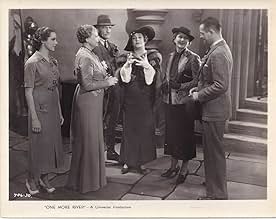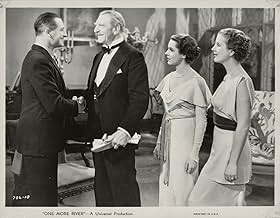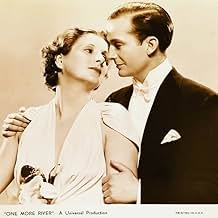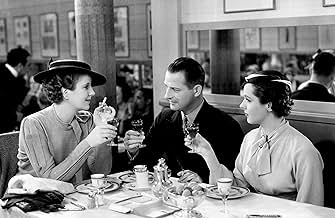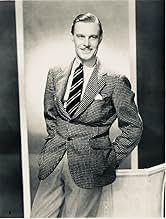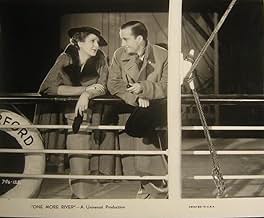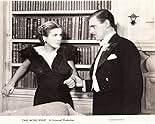Füge eine Handlung in deiner Sprache hinzuA young lady leaves her brutal husband and meets another man aboard a ship.A young lady leaves her brutal husband and meets another man aboard a ship.A young lady leaves her brutal husband and meets another man aboard a ship.
- Regie
- Drehbuch
- Hauptbesetzung
Empfohlene Bewertungen
"Claire" (Diana Winyard) is married to aspiring politician "Sir Gerald" (Colin Clive) but he's a bit of a brute. It's an incident with a riding crop that finally sends his wife on a cruise where she encounters "Croom" (Frank Lawton). Unfortunately, her husband cannot be seen to not have his wife at his side and so when she flatly refuses a reconciliation, he sets in motion a public divorce that will call the integrity of not just her, but of her new companion into question. Of course, though still entirely platonic, we know that the relationship between the two has burgeoned somewhat - but this isn't really a film about a romance. It's a rather sad indictment of a judicial system that still looked upon a woman as the property of her husband. Not in a feudal sense, but that she might accuse such a prominent and respectable man of ill-treating her was a charge that was always going to fall on deaf ears. It's the ensuing court hearing that brings this to life a bit, with some sparky sparring from lawyers "Brough" (Lionel Atwill), "Forsythe" (Alan Mowbray) and the inquisitive judge (Gilbert Emery) quite cleverly showcasing the one-sidedness of the whole affair. The film also befits from a great cast of supporting favourites who feature sparingly but add depth to a story of state-supported prejudice that Winyard holds together quite well.
This is one of Whale's favorites among his own works (the director even gave himself an uncredited bit!) but which he only got Universal to bankroll by accepting to helm another fantasy project for them, the subsequently aborted "A Trip To Mars". Anyway, this obscurely-titled melodrama is based on John Galsworthy (best-known for "The Forsythe Saga")'s last novel – adapted by the equally distinguished R.C. Sheriff. It tells of the vicissitudes of a young wife (Diana Wynyard, fresh from an Oscar nomination for the previous year's Best Picture winner CAVALCADE), about to be divorced from her brutish husband (a brief but typically impressive turn from Whale regular Colin Clive), who unwittingly adds coal to the fire via her initially platonic relationship with a young man (Frank Lawton, soon to play his most notable role as the grown-up David COPPERFIELD [1935]). The narrative also has a strong political element to it, not just in view of the subplot involving the electoral climate (personified by Reginald Denny's newly-appointed MP), but in the heroine's emancipation from the rigid status quo pertaining to woman's role in society.
While undeniably dated, the film boasts splendid cinematography and sets (by BRIDE OF FRANKENSTEIN's John J. Mescall and Charles D. Hall respectively) – the latter would be memorably refurbished and re-used for the Mary Shelley prologue and the Baron's own abode in that very film which rather suggests that the art director/set decorator's craft is not nearly appreciated enough! Apart from this, we get a truly remarkable supporting cast: lovely Jane Wyatt (as Wynyard's kid sister), C. Aubrey Smith (their father), Henry Stephenson (an uncle), the oddly-named Mrs. Patrick Campbell (hamming it up as his outspoken wife – apparently, she was like that in real-life too!), Lionel Atwill (the wily but pompous Prosecutor), Alan Mowbray (the defense counsel), Gilbert Emery (the genial Judge) and E.E. Clive (the other Clive's resourceful private detective).
Finally, the copy I acquired was sourced from an old TV broadcast off the U.K.'s Channel 4: despite a couple of intermissions for publicity spots(!), the quality is surprisingly adequate – much better, in fact, than that for most of the other Whales I have been watching lately.
While undeniably dated, the film boasts splendid cinematography and sets (by BRIDE OF FRANKENSTEIN's John J. Mescall and Charles D. Hall respectively) – the latter would be memorably refurbished and re-used for the Mary Shelley prologue and the Baron's own abode in that very film which rather suggests that the art director/set decorator's craft is not nearly appreciated enough! Apart from this, we get a truly remarkable supporting cast: lovely Jane Wyatt (as Wynyard's kid sister), C. Aubrey Smith (their father), Henry Stephenson (an uncle), the oddly-named Mrs. Patrick Campbell (hamming it up as his outspoken wife – apparently, she was like that in real-life too!), Lionel Atwill (the wily but pompous Prosecutor), Alan Mowbray (the defense counsel), Gilbert Emery (the genial Judge) and E.E. Clive (the other Clive's resourceful private detective).
Finally, the copy I acquired was sourced from an old TV broadcast off the U.K.'s Channel 4: despite a couple of intermissions for publicity spots(!), the quality is surprisingly adequate – much better, in fact, than that for most of the other Whales I have been watching lately.
Today, 1930s director James Whale is best remembered for "Frankenstein", "The Invisible Man", and "The Bride of Frankenstein", as well as for being probably the only openly gay person in cinema at the time (Ian McKellen played him in 1998's "Gods and Monsters"). Lesser known are Whale's dramas. There was "Waterloo Bridge", about a relationship strained by World War I, and "One More River", about a woman who flees an abusive marriage and hooks up with someone else. Not something usually depicted back then, so I wonder if it would've even been possible once the Hays Code went into effect the following year.
It's not a masterpiece, but passable. I find these fetishistic looks at the British ruling class weird (especially considering Whale's dirt-poor childhood). I suppose that nowadays, such a movie - whether focusing on the working class or ruling class - would probably come from Pedro Almodovar. Diana Wynyard, Jane Wyatt, Colin Clive (Dr. Frankenstein in Whale's more famous movies) and Frank Lawton all turn in fine performances.
It's not a masterpiece, but passable. I find these fetishistic looks at the British ruling class weird (especially considering Whale's dirt-poor childhood). I suppose that nowadays, such a movie - whether focusing on the working class or ruling class - would probably come from Pedro Almodovar. Diana Wynyard, Jane Wyatt, Colin Clive (Dr. Frankenstein in Whale's more famous movies) and Frank Lawton all turn in fine performances.
I enjoyed this film, but must be nearly alone in not particularly finding Diana Wynyard appealing in any real way, in her role as the unhappy, abused wife. Jane Wyatt on the other hand, as her sister, is sophisticated and lovely, very Myrna Loy.
Having read lots of books set in Edwardian England, I am familiar with the often ludicrous plots involved in setting up divorces and cases of criminal conversation. If you accept that the laws were limited and often ridiculous, you can overlook what seems so old-fashioned.
It is amusing to see Mrs. Patrick Campbell in action; she is a grand ham. The part of the abusive husband is a stereotype; he is oily and creepy and cruel. The new love is the opposite of course, charming and kind and gentle.
Overall a well-made film; just wish it had been made a year earlier before the draconian production code took over.
Having read lots of books set in Edwardian England, I am familiar with the often ludicrous plots involved in setting up divorces and cases of criminal conversation. If you accept that the laws were limited and often ridiculous, you can overlook what seems so old-fashioned.
It is amusing to see Mrs. Patrick Campbell in action; she is a grand ham. The part of the abusive husband is a stereotype; he is oily and creepy and cruel. The new love is the opposite of course, charming and kind and gentle.
Overall a well-made film; just wish it had been made a year earlier before the draconian production code took over.
"One More River" (1934) stars Diana Wynyard, Frank Lawton, Colin Clive as top-liners, but the rest of the cast is stellar! Mrs. Patrick Campbell, C. Aubrey Smith, Jane Wyatt, Reginald Denny, Henry Stephenson, Lionel Atwill, Alan Mowbray, Kathleen Howard, Gilbert Emery, E. E. Clive, and the list just keeps on going. This Universal Studios produced film will have most thinking it was made in England, as most of the stars and even the sets are about as English as can be. Beautifully appointed and directed by James Whale, just after coming off of "The Invisible Man" and just prior to "Bride of Frankenstein", this was more of a diversion for Whale, yet he handles it with major aplomb. Many today will consider the theme of suit for divorce based on adultery rather tame, and this would have had even more of a jolt in 1934 had the Code not just gone into effect, but the finished product still has the ability to hold our attention. Wynyard had just come off of her nomination for Best Actress Oscar for "Cavalcade", but she's much better here, and her quiet, if not elegant, though stolid performance serves the part well. She's matched by the ruthless, somewhat fey, but catty nastiness of her film husband, Colin Clive, in a part that shows he had genuine talent that captured range. Frank Lawton, who passionately loves Wynyard, and who is accused of being the co-respondent in the case against Wynyard, is less well-suited, but effective enough.
Written by John Galsworthy, this was much more potent when first released as a novel, but Whale has whittled the novel down to 88 minutes of film, and he's done it very effectively. The film is talkative, but its pristine presentation still packs a punch. Gorgeous cinematography, good direction, fine acting all around - this is recommended highly actually, though many today will wonder what all the hoopla is about. In effect, the film is now dated, and because it lacks the buzz-buzz of so much activity on screen, the CGI, the crash and bang of today's typical hit, let's say it will play better to those looking for something, not cerebral, but soap-operaish in an old-fashioned way.
Written by John Galsworthy, this was much more potent when first released as a novel, but Whale has whittled the novel down to 88 minutes of film, and he's done it very effectively. The film is talkative, but its pristine presentation still packs a punch. Gorgeous cinematography, good direction, fine acting all around - this is recommended highly actually, though many today will wonder what all the hoopla is about. In effect, the film is now dated, and because it lacks the buzz-buzz of so much activity on screen, the CGI, the crash and bang of today's typical hit, let's say it will play better to those looking for something, not cerebral, but soap-operaish in an old-fashioned way.
Wusstest du schon
- WissenswertesAccording to Jane Wyatt, "[James Whale] was crazy about Mrs. Pat [Mrs. Patrick Campbell]. The set was kind of run for her. The whole thing was to get her relaxed. She was playing up a lot about how nervous she was, and I think she got an awful lot of attention that way. i think we felt sorry for Mrs. Campbell. Poor dear--how ever are they going to pull her together. That was my reaction. We all had to pull her together and help her through.
- PatzerIn the opening scene, the liner pulling into the London dock that lady Corven arrives on is seen in the establishing shot is clearly named the ORFORD, yet after a we see her and Tony speak on the deck, another establishing shot of the ship now shows it is one called the ORSOVA.
- VerbindungenReferenced in Gods and Monsters (1998)
Top-Auswahl
Melde dich zum Bewerten an und greife auf die Watchlist für personalisierte Empfehlungen zu.
Details
- Erscheinungsdatum
- Herkunftsland
- Sprache
- Auch bekannt als
- Över floden
- Drehorte
- Produktionsfirma
- Weitere beteiligte Unternehmen bei IMDbPro anzeigen
- Laufzeit
- 1 Std. 28 Min.(88 min)
- Farbe
- Seitenverhältnis
- 1.37 : 1
Zu dieser Seite beitragen
Bearbeitung vorschlagen oder fehlenden Inhalt hinzufügen

